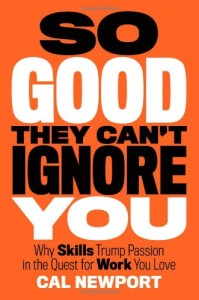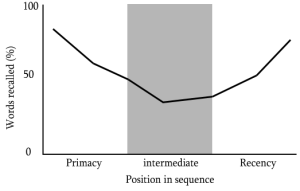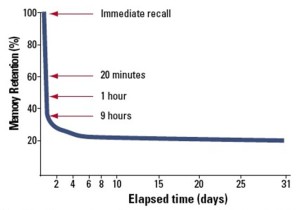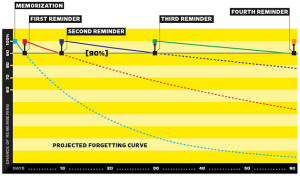 In a Nutshell: Cal Newport does his readers a great favor in rebutting the much-touted “follow your passion” school of careers advice. He then argues that because great jobs are rare and valuable, one must have/acquire rare and valuable skills to offer in order to obtain them. The rest of the book covers the merits of hard work, of leveraging this hard-earned career capital, and of developing a career mission. As it turns out, the overarching theme of the book is competence. As the title suggests, “Be so good they can’t ignore you.”
In a Nutshell: Cal Newport does his readers a great favor in rebutting the much-touted “follow your passion” school of careers advice. He then argues that because great jobs are rare and valuable, one must have/acquire rare and valuable skills to offer in order to obtain them. The rest of the book covers the merits of hard work, of leveraging this hard-earned career capital, and of developing a career mission. As it turns out, the overarching theme of the book is competence. As the title suggests, “Be so good they can’t ignore you.”
Recommended Reading For: Those contemplating their careers or career path.
Rating: 8/10
Where to Buy: Here
Notes/Summary/Outline: Here
The initial aim of this book is simple: To rebut the well-known “follow your passions” career advice. Cal Newport names this advice the Passion Hypothesis. For those who have grown tired of this “follow your dreams” approach to career advice, So Good They Can’t Ignore You will be a breath of fresh air. Rule 1 of the book is “Don’t Follow Your Passion.” Here is a list of the ways Newport supports this initial point:
- Compelling careers have complex origins that reject the Passion Myth
- Passions that pertain to careers are rare
- Career passions take time to develop
- Passion is a side effect of mastering one’s career skills
- The Passion Hypothesis gives people the unrealistic expectation that a mythical Perfect Job is waiting for them, which can cause unnecessary job dissatisfaction and a nonconstructive job-searching cycle.
As closer readers will see, these points do not fully deny the potential merits of the Passion Hypothesis. It is easy to come up with examples of people who chose to pursue skills they enjoyed exercising (e.g. math, cooking, meeting new people) and obtained satisfying careers in their pursuits (e.g. engineer, chef, salesperson). Newport seems to use passion in the stronger sense, as in “driving passion”. But relatively mild enjoyments, such as solving math puzzles, can easily be construed as “budding” or “minor” passions in the potential or weaker sense.
The fact that Newport does not totally debunk the Passion Hypothesis should not put readers off to this book. The purpose of the rebuttal is to inoculate against the idea that following one’s passion is the cure-all to career dissatisfaction. The Passion Hypothesis can indeed be dangerous. For example, dissatisfaction stemming from buying into the Passion Hypothesis can make the cycle of career jumping can be quite tempting. Especially, Newport points out, because people are notoriously bad at evaluating themselves and their careers objectively.
But the Passion Hypothesis is the subject of only a quarter of the book. The rest of the book is what I believe gives it substance: The main idea is that great jobs are rare and valuable, so one must acquire rare and valuable skills to obtain them. Newport explores three more guidelines to finding a career (I have paraphrased):
- Rule 2: Develop your skills and career capital
- Rule 3: Leverage the capital that you’ve acquired
- Rule 4: Combine your mission to your working life as you reach the cutting edge of your discipline
If we use the length of the book as an indicator of importance, the overarching theme of the book turns out not to be about debunking the Passion Principle at all. Only a fourth of the book is about the Passion Hypothesis. Newport stresses again and again that the single most important key to career satisfaction is Competence. Look over the above three guidelines again. Competence is at the heart of each of these rules.
I believe this book will be most useful for two groups of readers. The first group consists of those that are currently contemplating their career paths. This might include students and recent graduates searching for the “perfect job,” or those that have not yet invested significant time in a particular endeavor. These people will find this book to be a source of practical advice in choosing a path to take. If you are part of this group, you will find examples that show that you don’t necessarily have to make the perfect choice. It is far more important to follow through with gusto.
The second group consists of those that are currently considering major changes in their work lives, may it be moving workplaces, switching careers, or quitting altogether. If this sounds like you, now may be a good time to stop and read this book, to give you some perspective in what might happen to the capital you have built up these past few years. It is quite possible that there might be some factors you might not have considered. At the very least, skim through my Outline.
This book may be of use to a lesser extent to those who have already committed a significant (and perhaps at least partially satisfying) investment in an endeavor. Those of you that fall into this category will find your choices vindicated, compared to those of your peers who are job-hopping left and right.
In the end, the message of this book is simple. As the title suggests, it can be encapsulated in a quote by Steve Martin to Charlie Rose: “Be so good they can’t ignore you.”


